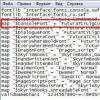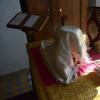Biseptol forte. Biseptol tablets. How to take Biseptol: indications and contraindications
Biseptol used to be very fond of prescribing doctors for any cold. Biseptol for children was the number one medicine for angina. But over the years, the infection has adapted to the action of many drugs, and today this medicine has already slightly lost its popularity.
Is biseptol an antibiotic
Antibiotic - a substance of microbial, animal, and vegetable origin, which is able to suppress the development of bacterial infection and destroy it.
But the pharmaceutical industry also produces semi-synthetic and synthetic drugs.
The components of the drug biseptol have nothing to do with natural antibacterial substances. Biseptol consists of artificial components that have been synthesized under laboratory conditions:
- Sulfamethoxazole is a sulfa drug.
- Trimethoprim is a substance that is used to enhance the effect of sulfomethoxazole.

Indications
Biseptol is prescribed for the treatment of the following diseases:
- brain abscess
- typhoid fever, paratyphoid fever,
- gonorrhea,
- infectious diseases of the respiratory system: bronchitis, pneumonia, pleurisy, lung abscess,
- infectious diseases of the skin,
- infectious diseases of the genitourinary system: urethritis, cystitis,
- meningitis,
- otitis media,
- sinusitis.
Contraindications
Biseptol is contraindicated in the following cases:
- Liver dysfunction.
- Kidney disease.
- Severe diseases of the heart and blood vessels.
- Pregnancy period.
- Hypersensitivity to the constituents of biseptol.
- Newborn babies under six weeks of age.
Biseptol should be used with extreme caution in the following conditions:
- a lack of folic acid in organism.
- Bronchial asthma.
- Allergy tendency.
If the drug is prescribed to a nursing woman, breast-feeding must stop.

Side effects
- Nausea, vomiting, diarrhea.
- Dizziness.
- Skin rash.
If in the course of treatment you develop any allergic manifestations, this is the reason for the abolition of Biseptol.
Instructions for use
Dosage for children:
- 2-5 years: 40 mg (these are 2 tablets (120 mg)) twice a day,
- six to twelve years: 480 mg each (these are 4 tablets (120 mg) or 1 tablet (480 mg)) twice a day,
- for adult patients and adolescents over twelve years of age: 960 mg twice a day, if long-term treatment is needed - 480 mg twice a day,
- pneumonia therapy: 100 mg of sulfamethoxazole per 1 kg of body weight per day. The break between taking the medication should be 6 hours, the duration of treatment is 2 weeks,
- gonorrhea therapy: 2 grams (in terms of sulfamethoxazole) twice a day with a break between doses of 12 hours.
The duration of drug treatment is usually from five days to 2 weeks. If therapy is needed for chronic diseases or the disease is severe, the dose of biseptol can be increased by 30-50%.
If the course of treatment exceeds five days or the doctor has increased single dose, it is imperative to monitor the composition of the blood. If any changes are found, folic acid is prescribed.
Interaction with other drugs
- With thiazide diuretics, the risk of increased bleeding and thrombocytopenia increases.
- With phenytoin - biseptol increases its anticonvulsant activity.
- It is not recommended to take the following drugs together with Biseptol:
- salicylates,
- butadion,
- naproxen,
- derivatives of para-aminobenzoic acid.
During the period of treatment, one should refrain from alcoholic beverages.
When is biseptolum powerless?
You need to know that with angina, which was provoked by beta-hemolytic streptococcus, the medicine does not work. This is because this type of bacterial infection is almost completely resistant to sulfonamides. During the period of antibiotic treatment, bacteria have formed that are not affected by sulfamethoxazole.
Therefore, with angina, you need to be very careful in choosing an antibiotic, since a mistake can cause complications, especially in young children. It is for this reason that a doctor should diagnose and prescribe treatment, since only a doctor can distinguish staphylococcal sore throat from streptococcal.
Precautionary measures

Biseptol should be used with extreme caution in people with the following diseases:
- Patients with alcoholism.
- Nutritional deficiency.
- Violation of hemopoiesis.
- Liver failure.
- Renal failure
- Syndrome of impaired absorption.
- Severe allergic diseases.
In the course of therapy, patients need to consume a large amount of liquid so that there is no blockage of the kidney tubules.
In elderly patients, the drug can cause kidney and liver damage, as well as serious allergic reactions.
Patients with AIDS who drink Biseptolum may experience the following complications:
- fever,
- rash,
- hyperkalemia,
- hyponatremia.
During the treatment period, direct sunlight should be avoided.
Forms of drug release

Biseptol can be found in pharmacies in the form of tablets, suspensions, and injection solutions:
- Tablets (120 mg).
- Tablets (480 mg).
- Bactrim Forte (960 mg).
- Syrup (100 ml).
- Substance for the preparation of a solution for injection (480 mg).
Instructions for use for children
Dosage:
- Children three to six months of age: Give the child 2.5 ml of syrup every 12 hours.
- Babies from seven months to three years old: 2.5-5 ml twice a day.
- Children from four to six years old: 5-10 ml twice a day.
- Age seven to twelve years: 10 ml of syrup twice a day.
- Over 12 years old: 20 ml twice a day.
How does the drug work for angina
Due to the fact that bacterial infection has the ability to adapt to antibiotics, some microorganisms have developed resistance to biseptol. Therefore, in recent years, the drug is less and less prescribed for angina.

Analogs
- Asakol.
- Dermazin.
- Ingalipt.
- Ingaflu.
Price
- Biseptol in the form of tablets (120 mg) - 20 pieces per package - price - about 40 rubles.
- Biseptol in the form of tablets (480 mg) - 20 pieces per package - price - about 70 rubles.
- Biseptol ampoules (480 mg) (5 ml) - 10 pieces per package - about 360 rubles.
- Biseptol syrup (80 ml) - about 140 rubles.
One of the most famous and controversial antibacterial drugs sold in Russia - Biseptol. In the 80-90s of the last century, Biseptol was at the peak of its popularity. The drug was prescribed by doctors of all specializations, from a district pediatrician to a narrow-profile urologist. Patients, sensing the effectiveness of the remedy, perceived it as a panacea for all ills. If at first we still did not risk buying Biseptol without a doctor's prescription, then soon such a "trifle" as the recommendation of a specialist began to seem superfluous. In Biseptol, they saw a panacea for any infection and took it almost uncontrollably for any reason, not excluding a common cold.
Meanwhile, any antibacterial drug is not at all so harmless. And many ardent admirers of Biseptol were convinced of this, unfortunately, from their own experience.
The modern pharmaceutical market offers a large number of safer and more effective antibacterial drugs. Biseptol's sales and popularity have fallen. However, therapists and pediatricians are still writing the long-learned words “Tab.Biseptoli” in recipes. And until now, in our pharmacies, they can sell Biseptol on the recommendation of not a doctor, but a friend, neighbor, or a completely stranger who gave advice in the line for bread.
In this article we will try to highlight the positive and negative aspects of the drug and answer the main questions: is Biseptol safe? Should I take this medicine uncontrollably and what is the risk?
Composition and release forms of Biseptol
Few people know that the name hides both the composition and the action of Biseptol. The particle "bi" comes from the Latin prefix "bis" - twice - and means that the composition includes two components. The second part of the name - "septol" - apparently came from the Latin "septicus", literally meaning "decay". In pharmaceuticals, drugs with the root "septol" in the name belong to the group of antiseptics.
So, what are the active ingredients in the composition? Biseptol is combined remedy, consisting of two components: sulfamethoxazole at a dose of 400 mg and trimethoprim in an amount of 80 mg. The figure indicated in the patented name "Biseptol 480" means nothing more than the total mass active ingredients drug.
The pharmaceutical industry produces four main forms of release:
- Biseptol 480 mg - tablets for adults;
- Biseptol 120 mg - tablets for children;
- Biseptol 240 mg - suspension for children. 5 ml of the drug contains 240 mg of a combination of sulfomethoxazole and trimethoprim;
- Biseptol 480 mg in ampoules containing a concentrate from which solutions for infusions are prepared - intravenous drip injections, or, more simply, droppers. Biseptol in ampoules is indicated for use in a hospital setting.
Some manufacturers have developed the release of Biseptol syrup for children containing 240 mg active ingredients.
The most popular forms of release that doctors and their patients have to deal with most often are Biseptol 480 mg in the form of tablets and Biseptol 240 mg suspension for children.
>> Recommended: if you are interested in effective methods of getting rid of chronic rhinitis, pharyngitis, tonsillitis, bronchitis and persistent colds, then be sure to look at this site page after reading this article. Information based on personal experience author and helped many people, we hope it will help you too. Now we return to the article.<<
How Biseptol works - pharmacological action
 Sulfamethoxazole is the main component of Biseptol, which has a fairly strong bactericidal effect. It disrupts the synthesis of dihydrofolic acid, which is necessary for microorganisms to function. Trimethoprim enhances the effect of sulfomethoxazole. Synergy, that is, the summation of the effects of the components of Biseptol, was first described in the late 60s.
Sulfamethoxazole is the main component of Biseptol, which has a fairly strong bactericidal effect. It disrupts the synthesis of dihydrofolic acid, which is necessary for microorganisms to function. Trimethoprim enhances the effect of sulfomethoxazole. Synergy, that is, the summation of the effects of the components of Biseptol, was first described in the late 60s.
The ratio in which the components are dosed is precisely verified. If in a Biseptol tablet it is about one to five, then when absorbed into the blood, the ratio of sulfamethoxazole and trimethoprim drops to one to twenty. These concentrations are required for the peak, maximum synergistic effect of the constituents.
Does Biseptol have anything to do with antibiotics or not?
This question so often worries patients that it is simply necessary to dot the i's. So, an antibiotic is a medicinal substance of natural (animal, plant or microbial origin), which has an antibacterial effect, completely suppressing both the growth and reproduction of bacteria. The modern pharmaceutical industry also produces semi-synthetic antibiotics.
Upon careful study of the instructions for Biseptol, it becomes obvious that its components have nothing to do with antibiotics. Both substances that make up the drug are synthesized in the laboratory. Sulfamethoxazole belongs to the group of sulfa drugs, and trimethoprim is used exclusively to enhance the effect of the main component.
The answer to the question whether Biseptol belongs to antibiotics or not is unambiguous and beyond doubt. Biseptol is a drug from the sulfonamide group that has an antibacterial effect. But not an antibiotic.
However, it is naive to believe that a remedy that does not belong to the notorious "harmful" antibiotics is as safe as multi-colored sweet vitamins. Sulfonamides are also serious drugs that must be taken exclusively under the supervision of a physician. Otherwise, you may face unpleasant consequences, including the formation of drug-resistant microorganisms. After all, it is not for nothing that all antibacterial agents - antibiotics, sulfonamides, and representatives of other pharmacological groups - belong to prescription drugs. And you shouldn't forget about it.
Biseptol: indications for use
The answer to a common and seemingly simple question, from which Biseptol still helps, cannot be unambiguous. After all, the combination of sulfamethoxazole and trimetroprim is a serious drug, the selection of which requires careful collection of information. Ideally, if this is done by a specialist. Let's try to figure out in which cases Biseptol is the drug of choice and when it is better to prefer another medicine to it.
 The main indications for the use of Biseptol are, of course, diseases caused by pathogenic microorganisms. The spectrum of action of the sulfamethoxazole-trimethoprim complex is quite wide and includes a variety of gram-positive, gram-negative bacteria, protozoa and even pathogenic fungi. Streptococci, staphylococci, Escherichia coli, Salmonella, Chlamydia, Toxoplasma and other microorganisms are exposed to the bactericidal action of the drug. Resistant to Biseptol tubercle bacillus, treponema, leptospira, pathogenic viruses.
The main indications for the use of Biseptol are, of course, diseases caused by pathogenic microorganisms. The spectrum of action of the sulfamethoxazole-trimethoprim complex is quite wide and includes a variety of gram-positive, gram-negative bacteria, protozoa and even pathogenic fungi. Streptococci, staphylococci, Escherichia coli, Salmonella, Chlamydia, Toxoplasma and other microorganisms are exposed to the bactericidal action of the drug. Resistant to Biseptol tubercle bacillus, treponema, leptospira, pathogenic viruses.
A fairly wide range of microorganisms sensitive to Biseptol leads to the same extensive list of diseases for which the drug is used. Let's try to figure out in what cases this drug is prescribed.
The most common gram-positive bacteria that commonly cause diseases of the upper and lower respiratory tract are staphylococci and streptococci. The high efficiency of Biseptol in relation to these microorganisms allows it to be successfully used for bacterial pharyngitis and tonsillitis - angina.
Biseptol also gives positive results for bacterial bronchitis. However, I would like to note that inflammation of the bronchi is often caused by viruses that are resistant to the action of antibacterial drugs. Therefore, be prudent: if you have a cough, you should not drink such remedies without a doctor's recommendation.
Inflammation of the maxillary sinuses - sinusitis - is most often caused by the same cocci, less often - chlamydia, mycoplasma and viruses. Despite the fact that the drugs of choice for sinusitis are antibiotics, sometimes Biseptol is still prescribed.
Is the treatment of intestinal infections justified?
 The activity of the drug against Escherichia coli allows Biseptol to be used for acute intestinal infections. It is important that the action of the drug extends to enterotoxigenic strains of the pathogen. Enterotoxigenic E. coli is responsible for severe bloody diarrhea, which is accompanied by general intoxication of the body. In addition, there is experience with the use of the drug for salmonellosis.
The activity of the drug against Escherichia coli allows Biseptol to be used for acute intestinal infections. It is important that the action of the drug extends to enterotoxigenic strains of the pathogen. Enterotoxigenic E. coli is responsible for severe bloody diarrhea, which is accompanied by general intoxication of the body. In addition, there is experience with the use of the drug for salmonellosis.
However, before deciding to use any antibacterial agent for intestinal infections, one important nuance should be remembered. All causative agents of these diseases are eliminated on their own within a week. In simple terms, a week after infection, the disease will stop without any treatment. This also applies to the notorious salmonellosis, one diagnosis of which sometimes leads the patient and his relatives into a state of panic.
Standard treatment protocols for acute intestinal infections do not include the use of any antibacterial drugs. The mainstay of therapy for such diseases is to ensure an adequate supply of fluid.
In severe cases (for example, with the development of infection in young children or the elderly, in patients with weakened immunity), it is still possible to prescribe antibacterial drugs. And again, Biseptol is not the gold standard in such cases - there are many other, safer drugs. For example, drugs from the nitrofuran group are not absorbed into the blood at all. The effectiveness and safety of these drugs is based on the fact that they only work in the intestinal lumen.
Therefore, in the overwhelming majority of cases, treatment of intestinal infections with Biseptol is absolutely unjustified.
Urinary tract infections
 The most common cause of urinary tract infections is E. coli. Approximately 80% of all inflammatory processes in the bladder are caused by this pathogen. Therefore, Biseptol, which is active against Escherichia coli, in some cases gives good results with cystitis.
The most common cause of urinary tract infections is E. coli. Approximately 80% of all inflammatory processes in the bladder are caused by this pathogen. Therefore, Biseptol, which is active against Escherichia coli, in some cases gives good results with cystitis.
However, it should be remembered that the antibiotic of the fluoroquinolone series is still the drug of choice for diseases of the urinary tract. It is impossible to approach the treatment of these pathologies negligently: with inadequate therapy, there is a rather high risk of chronicity of the pathological process. Untreated cystitis threatens chronic bladder inflammation that is difficult to treat.
Why is the uncontrolled use of Biseptol dangerous for cystitis? In fact, everything is very simple: the frequent use of Biseptol for a long time has led to the gradual emergence of resistance to the components of the drug. As a result, the effectiveness of the drug has significantly decreased.
In the treatment of many infections, the relief initially obtained is taken by the patient as complete cure. In fact, with the uncontrolled use of Biseptol, and other antibacterial drugs, there is a possibility that some particularly resistant microorganisms survived. With this development of events, the disease passes into a latent chronic phase. Chronic cystitis may not appear for some time, and this is its particular danger.
Therefore, it is not worth the risk. Cystitis and other diseases of the urinary tract should be treated by a doctor, and uncontrolled intake of Biseptol with these pathologies can be fraught with complications.
Biseptol for colds: is it necessary, contraindicated or useless?
 One of the most common misconceptions of Russian patients is blind faith in the mighty power of antibiotics for any disease. It is impossible to link this confidence with objective reasons. Our citizens stubbornly want to treat flu, colds and SARS with antibiotics. The worst thing is that often caring mothers conduct these experiments with their children.
One of the most common misconceptions of Russian patients is blind faith in the mighty power of antibiotics for any disease. It is impossible to link this confidence with objective reasons. Our citizens stubbornly want to treat flu, colds and SARS with antibiotics. The worst thing is that often caring mothers conduct these experiments with their children.
Let's look at this, of course, an important issue. Do you need antibacterial drugs, which include Biseptol, for colds or SARS?
For this, first of all, it is necessary to remember that colds, flu, and acute viral disease - ARVI - are caused by various viruses. And we already know that Biseptol, like any other antibacterial agent, does not affect viruses. Absolutely. Thus, using it for colds, we will not get any effect. Except for the side.
Useful information: How to restore intestinal microflora after taking antibiotics
A common cold or ARVI normally goes away on its own within a week or a little more. However, in debilitated patients, young children, elderly patients - all those who have malfunctions in the immune system - the disease can take a protracted course. This leads to a complication of the pathology and additional infection with bacteria. In such cases, an antibacterial drug is usually needed. And the use of Biseptol tablets will be very appropriate.
How to notice this line between viral and already complicated viral-bacterial infection? For a person far from medicine, it really is not so easy. One of the symptoms of a complicated viral disease is a sharp deterioration in the condition. For example, a significant increase in temperature after several days of illness and a period of relative calm. In this case, the fever either does not stop at all, or after taking antipyretics, the temperature drops very slowly and for a short time. A complication of infection may be indicated by the appearance of a severe cough, accompanied by sputum discharge. The treatment of a cold aggravated by a bacterial infection should be dealt with by a doctor who will select the correct antibacterial drug.
 The course of treatment with Biseptol is selected individually for each patient.
The course of treatment with Biseptol is selected individually for each patient.
For children, the drug is prescribed from 6 weeks of age. Young children are usually prescribed a suspension or syrup. Most often, Biseptol suspension is sold in pharmacies, in the annotations to which the recommended treatment regimen is clearly described, depending on the age of the child.
The standard dosage of Biseptol for children from six months to five years is 240 mg twice a day. 5 ml of suspension or syrup contains exactly 240 mg of sulfamethoxazole and trimethoprim, so it is very convenient to dose the drug. Even if you lose the measuring spoon that usually comes with the medicine, there will be no problem with taking it. Indeed, a standard teaspoon contains exactly 5 ml of solution. One teaspoon of Biseptol suspension or syrup in the morning and in the evening is enough for the child to receive a daily dose of sulfamethoxazole and trimethoprim.
If the child is able to swallow a pill, he is prescribed a tablet form of Biseptol at a dose of 120 mg. Children under 5 years old take 2 tablets at once twice a day.
Starting from the age of 6, the drug is prescribed at a dose of 480 mg twice a day, and it is most convenient to buy Biseptol tablets.
Starting from the age of 12, Biseptol is prescribed at a dose of 960 mg. Frequency rate of application - twice a day.
The course of treatment is selected depending on individual factors and can range from 5 days to two weeks. In severe cases, the doctor has the right to prescribe doses that exceed the standard recommended by 50%.
Features of the use of suspensions
I would like to draw your attention to the peculiarities of taking Biseptol suspension. Usually, the manufacturer tries to warn the patient to shake the bottle before using the medication. And unfortunately, not everyone complies with this requirement. Why is it so important to finish reading the annotation to Biseptol to the end and not forget to shake the suspension bottle?
Any suspension is a two-fraction system in which the active substance is present in undissolved form. It is evenly distributed only after vigorous shaking. Otherwise, you risk drinking a teaspoon of a suspension containing not 240 mg of Biseptol, but much less, and it is not possible to establish the exact mass.
If you bought Biseptol syrup, you can safely give it to your child without preliminary manipulations with the bottle - the syrup is absolutely homogeneous.
And finally. All children's forms of Biseptol - both syrup and suspension - taste good. Children are usually happy to be treated with these "edible" medicines, so be careful and keep the drug out of reach.
Admission rules, or How to drink Biseptol?
Any medication therapy should not be chaotic. If you have to drink antibiotics or sulfa antibacterial drugs, you should be especially careful about treatment. The effectiveness of the drug and the likelihood of adverse events depend on compliance with the rules of admission.
How to drink Biseptol correctly? You just need to remember about the following rules:
- it is necessary to observe a 12-hour interval between doses. For example, drink the morning dose at 8 o'clock in the morning, and the evening dose at 8 o'clock in the evening. Failure to comply with the regime threatens with a decrease in the antibacterial activity of Biseptol;
- you need to drink the drug (both tablets and suspension) only after meals. Otherwise, the medicine is irritating to the stomach wall;
- the minimum course of therapy should be at least five days. All lovers of treatment in three days must arm themselves with patience. Otherwise, you run the risk of getting a complication of the infection, which will also be difficult to respond to antibiotic therapy.
Side effect
 If you carefully read the instructions for Biseptol, the abundance of information about the side effects of the drug can shock even the most sophisticated reader. But in practice, things are not so threatening.
If you carefully read the instructions for Biseptol, the abundance of information about the side effects of the drug can shock even the most sophisticated reader. But in practice, things are not so threatening.
As a rule, in the recommended doses, both the tablets and the Biseptol suspension are well tolerated. The most common side effects usually do not require discontinuation of the drug. Among the most common adverse events, I would like to note:
- dermatological manifestations in the form of rash and urticaria. Allergic reactions are more common in sensitized (sensitive) patients;
- disruption of the gastrointestinal tract: nausea, occasionally diarrhea, loss of appetite, stomatitis.
With long-term use of high dosages of Biseptol, side effects may be more pronounced. Occasionally, serious allergic reactions are recorded, the development of candidiasis is possible due to a change in the composition of the intestinal microflora.
I would like to reassure those patients who, having read the instructions for Biseptol to the "Side Effects" section and being horrified, make a responsible decision to be treated with folk, and not "harmful" medicine.
The list of side effects includes all the symptoms that were recorded during the testing of the drug. The number of patients participating in clinical trials is usually several thousand. Post-marketing trials last throughout the entire sales period of the drug. Each patient is a potential participant in these studies, and the fact that he has a new side effect will be recorded in the annotation. Therefore, the likelihood of most side effects in light of the high numbers is extremely small. So, the manufacturer of Biseptol describes the possibility of hematopoietic disorders, but if the recommended doses are observed, this effect is observed in only one of several hundred patients.
Contraindications
 Biseptol is prescribed for the treatment of children, but it is not recommended to use the drug in infants under six weeks of age. In addition, Biseptol is categorically contraindicated during pregnancy and lactation. Sulfamethoxazole and trimethoprim perfectly penetrate the placental barrier. High doses of Biseptol components are also found in breast milk. Consequently, pregnant and lactating women will have to select other, safer antibacterial agents.
Biseptol is prescribed for the treatment of children, but it is not recommended to use the drug in infants under six weeks of age. In addition, Biseptol is categorically contraindicated during pregnancy and lactation. Sulfamethoxazole and trimethoprim perfectly penetrate the placental barrier. High doses of Biseptol components are also found in breast milk. Consequently, pregnant and lactating women will have to select other, safer antibacterial agents.
In addition, Biseptol is contraindicated in patients with severe diseases of internal organs: liver, kidneys, as well as hematopoietic disorders.
Separately, I would like to note as a contraindication individual sensitivity to sulfa drugs. The likelihood of an individual reaction is usually extremely low and possible in sensitized patients. Be careful when taking Biseptol if you have ever had allergic reactions to medications (for example, an allergic rhinitis). For the same patients who had any manifestations of sensitivity to streptocide, phthalazol, sulfadimethoxine, Biseptol is categorically contraindicated. In this case, the likelihood of an allergy is very high!
If side effects occur during treatment, it is very important to inform your doctor immediately.
When does Biseptol not work?
 I would especially like to note that with angina caused by beta-hemolytic streptococcus, Biseptol is not recommended for use. The fact is that strains of group A hemolytic streptococcus are almost completely resistant to sulfa drugs. Over a long period of therapy with antibacterial drugs, microorganisms have formed, on which sulfamethoxazole does not have a bactericidal effect.
I would especially like to note that with angina caused by beta-hemolytic streptococcus, Biseptol is not recommended for use. The fact is that strains of group A hemolytic streptococcus are almost completely resistant to sulfa drugs. Over a long period of therapy with antibacterial drugs, microorganisms have formed, on which sulfamethoxazole does not have a bactericidal effect.
An error in the selection of a drug for tonsillitis can lead to complications, especially in young children. Therefore, it is necessary to examine and consult a doctor: only a specialist can distinguish streptococcal sore throat from staphylococcal sore throat.
A question of choice, or how to replace Biseptol?
The pharmaceutical market is usually saturated with analogues that can fully replace the drug. It is often difficult even for a doctor to understand the abundance of different drugs. And a person who is not related to medicine, an excessive abundance of analogues or generics can be confusing. Let's try to figure out what can replace Biseptol in Russia.
Most often, it is Biseptol in tablets and children's suspension made in Poland that is sold in pharmacies. A fairly common drug from the French company Senexi Bactrim is also not inferior in quality to the original remedy. The Russian company Pharmstandard produces a cheaper analogue of Biseptol in tablets and suspensions - Co-trimoxazole at a dose of 480 mg and 240 mg, respectively. Medicines under the same name are also produced by other Russian pharmaceutical companies. All of them are distinguished by a democratic price.
The rest of the modern analogues of Biseptol are extremely rare. Sometimes pharmacies offer very high-quality Dutch Bi-septin tablets (manufactured by NaturProduct) and Septrin, produced by the world-famous English concern Glaxo.
Release form
Pills
Composition
Active ingredient: Co-trimoxazole [Sulfamethoxazole + Trimethoprim] (Co-trimoxazolum) Concentration of active ingredient (mg): Sulfamethoxazole 400 mg, trimethoprim 80 mg
Pharmacological effect
Combined antibacterial drug, contains sulfamethoxazole and trimethoprim. Sulfamethoxazole, which is similar in structure to PABA, disrupts the synthesis of dihydrofolic acid in bacterial cells, preventing the inclusion of PABA in its molecule. Trimethoprim enhances the effect of sulfamethoxazole, which is responsible for the reduction of dihydrofolic acid - phymic acid. for protein metabolism and division of microbial cells. It is a bactericidal drug with a wide spectrum of activity. It is active against gram-positive aerobic bacteria: Streptococcus spp., including Streptococcus pneumoniae (hemolytic strains are more sensitive to penicillin), Staphylococcus spp., Bacillus anthracoides asistertoides , Enterococcus faecalis, Mycobacterium spp. (including Mycobacterium leprae, excluding Mycobacterium tuberculosis); gram-negative aerobic bacteria: Neisseria meningitidis, Neisseria gonorrhoeae, Escherichia coli (including enterotoxogenic strains), Salmonella spp. (including Salmonella typhi and Salmonella paratyphi); Vibrio cholerae, Haemophilus influenzae (including ampicillin resistant strains), Bordetella pertussis, Klebsiella spp., Proteus spp., Pasteurella spp., Francisella tularensis, Brucella spp., Citrobacter spp., Enterobacter spp., Some except Pseudomonas aeruginosa), Serratia marcescens, Shigella spp., Yersinia spp., Morganella spp., as well as for Chlamydia spp. (including Chlamydia trachomatis, Chlamydia psittaci); in relation to gram-positive anaerobes: Actinomyces israelii; for protozoa: Plasmodium spp., Toxoplasma gondii; pathogenic fungi: Coccidioides immitis, Histoplasma capsulatum, Pneumocystis carinii, Leishmania spp. Resistant to the drug: Corynebacterium spp., Pseudomonas aeruginosa, Mycobacterium tuberculosis, Treponema spp., Leptospira spp. , riboflavin, niacin and other B vitamins in the intestine. The duration of the therapeutic effect is 7 hours.
Pharmacokinetics
Absorption After taking the drug inside, the active substances are quickly and completely absorbed from the gastrointestinal tract. Cmax in blood plasma is achieved within 1-4 hours after ingestion. Distribution Trimethoprim penetrates well into tissues and biological environments of the body: lungs, kidneys, prostate, bile, saliva, phlegm, cerebrospinal fluid. The plasma protein binding of trimethoprim is 50%; sulfamethoxazole - 66%. Excretion of T1 / 2 trimethoprim - 8.6-17 hours, sulfamethoxazole - 9-11 hours. The main route of excretion is the kidneys; while trimethoprim is excreted unchanged up to 50%; sulfamethoxazole - 15-30% in active form.
Indications
Treatment of infectious and inflammatory diseases caused by microorganisms sensitive to the drug: - respiratory tract infections (including bronchitis, pneumonia, lung abscess, pleural empyema); - otitis media, sinusitis; - infections of the genitourinary system (including pyelonephritis, urethritis, salpingitis, prostatitis); - gonorrhea; - gastrointestinal tract infections (including typhoid fever, paratyphoid fever, bacterial dysentery, cholera, diarrhea); - skin and soft tissue infections (including furunculosis, pyoderma).
Contraindications
Established damage to the liver parenchyma; - severe renal dysfunction in the absence of the ability to control the concentration of the drug in the blood plasma; - severe renal failure (CC less than 15 ml / min); - severe blood diseases (aplastic anemia, B12-deficiency anemia, agranulocytosis, leukopenia , megaloblastic anemia, anemia associated with a deficiency of folic acid); - hyperbilirubinemia in children; - deficiency of glucose-6-phosphate dehydrogenase (risk of hemolysis); - pregnancy; - lactation; - children under 3 years of age (for this dosage form); - hypersensitivity to the components of the drug; - hypersensitivity to sulfonamides.
Precautionary measures
Application during pregnancy and lactation
Biseptol is contraindicated for use during pregnancy and lactation (breastfeeding).
Method of administration and dosage
Set individually. The drug is taken after a meal with a sufficient amount of liquid. For children aged 3 to 5 years, the drug is prescribed at 240 mg (2 tablets, 120 mg each) 2 times / day; children aged 6 to 12 years - 480 mg (4 tablets of 120 mg or 1 tablet of 480 mg) 2 times / day.In case of pneumonia, the drug is prescribed at the rate of 100 mg of sulfamethoxazole per 1 kg of body weight / day. The interval between doses is 6 hours, the duration of administration is 14 days. In gonorrhea, the dose of the drug is 2 g (in terms of sulfamethoxazole) 2 times / day with an interval between doses of 12 hours. Adults and children over 12 years old are prescribed the drug 960 mg 2 times / day, with long-term therapy - 480 mg 2 times / day. The duration of the course of treatment is from 5 to 14 days. In a severe course of the disease and / or in chronic infections, a single dose may be increased by 30-50%. If the course of therapy lasts more than 5 days and / or an increase in the dose of the drug, it is necessary to control the peripheral blood picture; when pathological changes appear, folic acid should be prescribed at a dose of 5-10 mg / day. In patients with renal insufficiency with a CC of 15-30 ml / min, the standard dose of Biseptol should be reduced by 50%.
Side effects
From the side of the central nervous system and peripheral nervous system: headache, dizziness; in some cases - aseptic meningitis, depression, apathy, tremor, peripheral neuritis. From the respiratory system: bronchospasm, choking, cough, pulmonary infiltrates. From the digestive system: nausea, vomiting, loss of appetite, diarrhea, gastritis, abdominal pain, glossitis, stomatitis, cholestasis, increased activity of hepatic transaminases, hepatitis, sometimes with cholestatic jaundice, hepatonecrosis, pseudomembranous enterocolitis, pancreatitis. From the side of the hematopoietic system: leukopenia, neutropenia, thrombocytopenia, agranulocytosis, megaloblastic hemorrhage methemoglobinemia. from the urinary system: polyuria, interstitial nephritis, impaired renal function, crystalluria, hematuria, increased urea concentration, hypercreatininemia, toxic nephropathy with oliguria and anuria. from the musculoskeletal system: arthralgia, myalgia, allergic reactions: allergic reactions. , urticaria, medicinal fever, rash, erythema multiforme exudative (incl. Stevens-Johnson syndrome), toxic epidermal necrolysis (Lyell's syndrome), exfoliative dermatitis, allergic myocarditis, fever, angioedema, hyperemia of the sclera. From the metabolic side: hypoglycemia, hyperkalemia, hyponatremia. The drug is generally well tolerated.
Overdose
Symptoms: lack of appetite, intestinal colic, nausea, vomiting, dizziness, headache, drowsiness, loss of consciousness, fever, hematuria, crystalluria are also possible. Later, bone marrow depression and jaundice may develop. After acute poisoning with trimethoprim, nausea, vomiting, dizziness, headache, depression, impaired consciousness, depression of bone marrow function are possible. It is not known what dose of co-trimoxazole can be life-threatening. Chronic poisoning: use co-trimoxazole in high doses over a prolonged period can lead to inhibition of bone marrow function, manifested by thrombocytopenia, leukopenia or megaloblastic anemia. Treatment: discontinuation of the drug and taking measures aimed at removing it from the gastrointestinal tract (wash the stomach no later than 2 hours after ingestion drug or induce vomiting), drinking plenty of fluids, if diuresis is insufficient, and kidney function is preserved. Introduce calcium folinate (5-10 mg / day). The acidic environment of urine accelerates the excretion of trimethoprim, but may also increase the risk of crystallization of sulfonamide in the kidneys. The blood picture, the composition of electrolytes in plasma and other biochemical parameters should be monitored. Hemodialysis is moderately effective and peritoneal dialysis is not effective.
Interaction with other drugs
With the simultaneous use of Biseptol with thiazide diuretics, there is a risk of thrombocytopenia and bleeding (the combination is not recommended). Co-trimoxazole increases the anticoagulant activity of indirect anticoagulants, as well as the effect of hypoglycemic drugs and methotrexate. Co-trimoxazole decreases the intensity of hepatic metabolism (T1). 2 by 39%) and warfarin, increasing their effect. Rifampicin reduces the T1 / 2 of trimethoprim. With the simultaneous use of pyrimethamine in doses exceeding 25 mg / week, increases the risk of megaloblastic anemia. With the simultaneous use of diuretics (usually thiazides) increase the risk of developing thrombocytopenia. Benzocaine, procaine, procainamide (like other drugs, as a result of hydrolysis of which PABA is formed) reduce the effectiveness of Biseptol. Between diuretics (including thiazides, furosemide) and oral hypoglycemic agents (sulfonylurea derivatives) on the one hand, and anti-tank Terial agents of the sulfonamide group - on the other hand, the development of a cross-allergic reaction is possible. Phenytoin, barbiturates, PASK increase the manifestations of folic acid deficiency when used simultaneously with Biseptol. Salicylic acid derivatives enhance the effect of Biseptol. Ascorbic acid, hexamethylenetetramine (as well as other acidifying drugs urine) increase the risk of crystalluria during the use of Biseptol. Colestyramine reduces absorption when taken simultaneously with other drugs, so it should be taken 1 hour after or 4-6 hours before taking co-trimoxazole. hematopoiesis, the risk of myelosuppression increases. In some cases, Biseptol may increase the concentration of digoxin in the blood plasma in elderly patients. Biseptol may decrease the effectiveness of tricyclic antidepressants. In patients after kidney transplantation, with one With the temporary use of co-trimoxazole and cyclosporine, there is a passing dysfunction of the transplanted kidney, manifested by an increase in serum creatinine concentrations, which is probably caused by the action of trimethoprim. Reduces the effectiveness of oral contraception (inhibits the intestinal microflora and reduces the intestinal-hepatic circulation of hormonal agents).
special instructions
The drug is prescribed with caution in case of a burdened allergic history. With prolonged (more than a month) courses of treatment, regular blood tests are required, since there is a likelihood of hematological changes (most often asymptomatic). These changes can be reversible with the appointment of folic acid (3-6 mg / day), which does not significantly violate the antimicrobial activity of the drug. Particular care is needed when treating elderly patients or patients with suspected baseline folate deficiency. Prescribing folic acid is also advisable for long-term treatment with the drug in high doses.To prevent crystalluria, it is recommended to maintain a sufficient volume of excreted urine. The likelihood of toxic and allergic complications of sulfonamides significantly increases with a decrease in the filtration function of the kidneys. It is also inappropriate during treatment to consume foods containing a large amount of PABA - green parts of plants (cauliflower, spinach, legumes), carrots, tomatoes. Excessive sun exposure and UV radiation. The risk of side effects is significantly higher in AIDS patients. It is not recommended to use the drug for tonsillitis and pharyngitis caused by β-hemolytic streptococcus group A, due to the widespread resistance of strains. Trimethoprim can change the results of determining the level of serum methotrexate, carried out by enzymatic method, however, does not affect the result when choosing a radioimmunoassay method. Co-trimoxazole can increase the results of the Jaffe reaction with picric acid for the quantitative determination of creatinine by 10%.
"Biseptol" has been known for more than a dozen years. In Soviet times, it was the most popular drug for almost any disease of an infectious nature, it is available for both adults and children, its price is not high, but the drug is effective. Gradually, it was replaced by new drugs with a wide spectrum of action and effectiveness. But even today "Biseptol" does not lose its relevance, and doctors' reviews confirm this.
Composition and principle of action
When is Biseptol used and how much should you drink? One 120 mg Biseptol tablet contains 100 mg of sulfamethoxazole, 20 mg of trimethoprim and additional components. Accordingly, a dose of 240 mg or 480 mg contains two and three times more active substances. The combined action of the components of the drug is aimed at inhibiting the formation of folic acid in the bacterial cell. Substances are selected in such a way that they enhance the action of each other. This adds to the effectiveness of the drug.
Its action is as follows:
- sulfamethoxazole- has a structure similar to para-aminobenzoic acid, due to which it interferes with the formation of folic acid;
- trimethoprim - slows down the transition of vitamin B9 precursors to the active form.
This creates minimal concentrations of folic acid, which is essential for the growth and development of bacteria. "Biseptol" in high concentration causes the death of pathogens susceptible to it and, thus, eliminates the infection.
The activity of the drug extends to the following microorganisms:
- colibacillus;
- streptococci;
- staphylococci;
- pneumococci;
- bacteria of typhoid and dysentery;
- gonococci;
- salmonella;
- haemophilus influenzae;
- klebsiella;
- enterococcus;
- chlamydia;
- toxoplasma;
- leishmania.
The remedy does not work on Pseudomonas aeruginosa and tubercle bacillus, leptospira, spirochetes and viruses.
When to use
Modern doctors "Biseptol" are prescribed for pathologies caused by pathogenic microbes susceptible to the effects of sulfamethoxazole. The method of application is shown in the table.
| Organs or organ systems | Pathology |
|---|---|
| Upper respiratory tract | - Chronic and acute bronchitis; - inflammatory lesions of the pleura; - pneumonia; - abscesses; - inflammatory complications of bronchiectasis; - laryngitis |
| ENT organs | - Otitis; - sinusitis (for example, sinusitis, frontal sinusitis); - inflammation of the tonsils (tonsillitis); - an infectious process in the mucous membrane of the larynx and pharynx |
| Genitourinary organs | - Inflammation of the uterine appendages; - prostatitis; - urethritis; - cystitis; - epididymitis; - chronic pyelonephritis; - gonorrhea |
| Digestive system | - Diarrhea of bacterial etiology, including food poisoning; - inflammation of the bile ducts |
| Leather | - Acne; - purulent lesions of hair follicles and soft tissues |
| Severe infectious and inflammatory diseases with high fever | - Meningitis; - sepsis; - purulent lesions of the bone marrow; - severe infections after injuries |
"Biseptol" is effective against toxoplasmosis, malaria. For children, "Biseptol" is prescribed in case of contraindications to antibiotics or an allergic reaction to commonly used drugs. High efficiency of treatment is achieved with angina, cough with bronchitis, as well as with sinusitis, pneumonia, middle ear, intestinal infections, furunculosis, enlarged lymph nodes. It should only be used as directed by a doctor.
Contraindications
After taking "Biseptol" quickly penetrates into the systemic circulation and after three to five hours reaches its maximum concentrations. It is metabolized in the liver. High concentrations of the drug are created in the kidneys, since it is mainly excreted in the urine. Contraindications for admission are as follows:
- hypersensitivity to the components of the drug;
- complex forms of heart failure;
- liver pathology with damage or death of its cells;
- renal failure;
- anemia caused by a lack of folic acid;
- pathology of blood and bone marrow;
- bronchial asthma;
- hay fever;
- atopic (allergic) dermatitis.
Biseptol should not be taken if the patient has had an immunological decrease in platelet levels in the past caused by taking the drug.
The components of the drug help to reduce the content of folic acid and can lead to its deficiency. In addition, the use of medication in the third trimester of gestation can contribute to the onset of kernicterus in the fetus. Therefore, "Biseptol" during pregnancy and during breastfeeding is categorically contraindicated for admission, and you can not use it for children under three months.
In cases of the use of "Biseptol" in pregnant women, an additional intake of 5 g of folic acid is required daily. Elderly people should take this drug with great care. The same applies to patients with thyroid pathologies.
Instructions for the use of "Biseptol"
The dosage of "Biseptol" and the duration of use are prescribed by the doctor individually in each case. You can take a convenient form, the dosage regimens do not differ in the amount of the active substance.
"Biseptol" is available in tablets of 120 (for children) and 480 mg, in the form of syrup and suspension in ampoules for oral administration. The schemes for the use of various forms of the drug are described in the tables.
Table - How to take "Biseptol" correctly depending on age
Tablets or suspension must be taken after meals with clean, non-carbonated water. The course of admission lasts up to 14 days. If therapy continues for more than five days, it is recommended to monitor blood counts. In case of abnormal fluctuations, up to 10 mg of folic acid per day is additionally prescribed.
Depending on the type and severity of the infectious process, the standard dosage of "Biseptol" may vary, as can be seen from the table.
Table - Individual schemes for taking "Biseptol"
In severe forms of the infectious and inflammatory process, the doctor can double the dose.
Side effects and overdose
The instructions indicate the good tolerance of the drug and the minimum risk of side effects. But still, the following can be distinguished:
- nausea, vomiting, and diarrhea;
- headache, dizziness;
- tendency to depression;
- inflammation of the peripheral nerves;
- bronchial spasms, asthma attacks and coughing;
- obstructed outflow of bile;
- acute inflammation of the large intestine;
- a decrease in the level of neutrophils (agranulocytosis);
- a decrease in the number of leukocytes and platelets in the blood;
- deficiency of vitamin B12 and folic acid;
- severe allergic dermatitis;
- the appearance of blood in the urine, crystalluria.
People with HIV are more likely to have side effects.
In case of an overdose of the drug, headache, nausea, vomiting, abdominal pains are aggravated, red blood counts change. Treatment is symptomatic, including gastric lavage and, if necessary, administration of drugs to restore folic acid levels. For example, based on calcium folinate.
special instructions
When taking "Biseptol" there is a risk of salt crystals in the urine and the formation of kidney stones, therefore, to prevent such side effects throughout the treatment, it is necessary to consume a sufficient amount of liquid and monitor the tests.
The simultaneous use of the drug with diuretics increases the risk of hypokalemia (decrease in potassium in the blood) and bleeding. For the period of treatment, it is recommended to completely abandon alcohol so as not to provoke toxic hepatitis. With prolonged therapy, it is necessary to take tests to monitor the functional state of the kidneys, liver and control hematological parameters.
Analogs
The following drugs are analogous to the active ingredients:
- "Bactrim";
- "Septrin";
- "Sumetrolim";
- "Berlocid";
- "Tseplin";
- "Co-trimoxazole".
"Biseptol" has been known for more than a dozen years. In Soviet times, it was the most popular drug for almost any disease of an infectious nature, it is available for both adults and children, its price is not high, but the drug is effective. Gradually, it was replaced by new drugs with a wide spectrum of action and effectiveness. But even today "Biseptol" does not lose its relevance, and doctors' reviews confirm this.
Composition and principle of action
When is Biseptol used and how much should you drink? One 120 mg Biseptol tablet contains 100 mg of sulfamethoxazole, 20 mg of trimethoprim and additional components. Accordingly, a dose of 240 mg or 480 mg contains two and three times more active substances. The combined action of the components of the drug is aimed at inhibiting the formation of folic acid in the bacterial cell. Substances are selected in such a way that they enhance the action of each other. This adds to the effectiveness of the drug.
Its action is as follows:
- sulfamethoxazole- has a structure similar to para-aminobenzoic acid, due to which it interferes with the formation of folic acid;
- trimethoprim - slows down the transition of vitamin B9 precursors to the active form.
This creates minimal concentrations of folic acid, which is essential for the growth and development of bacteria. "Biseptol" in high concentration causes the death of pathogens susceptible to it and, thus, eliminates the infection.
The activity of the drug extends to the following microorganisms:
- colibacillus;
- streptococci;
- staphylococci;
- pneumococci;
- bacteria of typhoid and dysentery;
- gonococci;
- salmonella;
- haemophilus influenzae;
- klebsiella;
- enterococcus;
- chlamydia;
- toxoplasma;
- leishmania.
The remedy does not work on Pseudomonas aeruginosa and tubercle bacillus, leptospira, spirochetes and viruses.
When to use
Modern doctors "Biseptol" are prescribed for pathologies caused by pathogenic microbes susceptible to the effects of sulfamethoxazole. The method of application is shown in the table.
| Organs or organ systems | Pathology |
|---|---|
| Upper respiratory tract | - Chronic and acute bronchitis; - inflammatory lesions of the pleura; - pneumonia; - abscesses; - inflammatory complications of bronchiectasis; - laryngitis |
| ENT organs | - Otitis; - sinusitis (for example, sinusitis, frontal sinusitis); - inflammation of the tonsils (tonsillitis); - an infectious process in the mucous membrane of the larynx and pharynx |
| Genitourinary organs | - Inflammation of the uterine appendages; - prostatitis; - urethritis; - cystitis; - epididymitis; - chronic pyelonephritis; - gonorrhea |
| Digestive system | - Diarrhea of bacterial etiology, including food poisoning; - inflammation of the bile ducts |
| Leather | - Acne; - purulent lesions of hair follicles and soft tissues |
| Severe infectious and inflammatory diseases with high fever | - Meningitis; - sepsis; - purulent lesions of the bone marrow; - severe infections after injuries |
"Biseptol" is effective against toxoplasmosis, malaria. For children, "Biseptol" is prescribed in case of contraindications to antibiotics or an allergic reaction to commonly used drugs. High efficiency of treatment is achieved with angina, cough with bronchitis, as well as with sinusitis, pneumonia, middle ear, intestinal infections, furunculosis, enlarged lymph nodes. It should only be used as directed by a doctor.
Contraindications
After taking "Biseptol" quickly penetrates into the systemic circulation and after three to five hours reaches its maximum concentrations. It is metabolized in the liver. High concentrations of the drug are created in the kidneys, since it is mainly excreted in the urine. Contraindications for admission are as follows:
- hypersensitivity to the components of the drug;
- complex forms of heart failure;
- liver pathology with damage or death of its cells;
- renal failure;
- anemia caused by a lack of folic acid;
- pathology of blood and bone marrow;
- bronchial asthma;
- hay fever;
- atopic (allergic) dermatitis.
Biseptol should not be taken if the patient has had an immunological decrease in platelet levels in the past caused by taking the drug.
The components of the drug help to reduce the content of folic acid and can lead to its deficiency. In addition, the use of medication in the third trimester of gestation can contribute to the onset of kernicterus in the fetus. Therefore, "Biseptol" during pregnancy and during breastfeeding is categorically contraindicated for admission, and you can not use it for children under three months.
In cases of the use of "Biseptol" in pregnant women, an additional intake of 5 g of folic acid is required daily. Elderly people should take this drug with great care. The same applies to patients with thyroid pathologies.
Instructions for the use of "Biseptol"
The dosage of "Biseptol" and the duration of use are prescribed by the doctor individually in each case. You can take a convenient form, the dosage regimens do not differ in the amount of the active substance.
"Biseptol" is available in tablets of 120 (for children) and 480 mg, in the form of syrup and suspension in ampoules for oral administration. The schemes for the use of various forms of the drug are described in the tables.
Table - How to take "Biseptol" correctly depending on age
Tablets or suspension must be taken after meals with clean, non-carbonated water. The course of admission lasts up to 14 days. If therapy continues for more than five days, it is recommended to monitor blood counts. In case of abnormal fluctuations, up to 10 mg of folic acid per day is additionally prescribed.
Depending on the type and severity of the infectious process, the standard dosage of "Biseptol" may vary, as can be seen from the table.
Table - Individual schemes for taking "Biseptol"
In severe forms of the infectious and inflammatory process, the doctor can double the dose.
Side effects and overdose
The instructions indicate the good tolerance of the drug and the minimum risk of side effects. But still, the following can be distinguished:
- nausea, vomiting, and diarrhea;
- headache, dizziness;
- tendency to depression;
- inflammation of the peripheral nerves;
- bronchial spasms, asthma attacks and coughing;
- obstructed outflow of bile;
- acute inflammation of the large intestine;
- a decrease in the level of neutrophils (agranulocytosis);
- a decrease in the number of leukocytes and platelets in the blood;
- deficiency and folic acid;
- severe allergic dermatitis;
- the appearance of blood in the urine, crystalluria.
People with HIV are more likely to have side effects.
In case of an overdose of the drug, headache, nausea, vomiting, abdominal pains are aggravated, red blood counts change. Treatment is symptomatic, including gastric lavage and, if necessary, administration of drugs to restore folic acid levels. For example, based on calcium folinate.
special instructions
When taking "Biseptol" there is a risk of salt crystals in the urine and the formation of kidney stones, therefore, to prevent such side effects throughout the treatment, it is necessary to consume a sufficient amount of liquid and monitor the tests.
The simultaneous use of the drug with diuretics increases the risk of hypokalemia (decrease in potassium in the blood) and bleeding. For the period of treatment, it is recommended to completely abandon alcohol so as not to provoke toxic hepatitis. With prolonged therapy, it is necessary to take tests to monitor the functional state of the kidneys, liver and control hematological parameters.
Analogs
The following drugs are analogous to the active ingredients:
- "Bactrim";
- "Septrin";
- "Sumetrolim";
- "Berlocid";
- "Tseplin";
- "Co-trimoxazole".



















